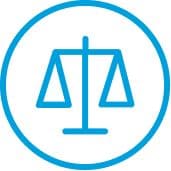What are some possible Generative AI uses?
The CLO’s guide to Generative AI risks and opportunities
Generative AI (GenAI) has the potential to transform legal functions by freeing legal executives and their teams to spend more time on strategic and business-oriented work. How? GenAI excels at many of the more time-consuming tasks for lawyers; reducing the time they dedicate to those tasks allows CLOs to focus on adding value in the areas where their specialized skill set is most beneficial.
Many CLOs see the benefits of these advancements. In the 2024 CLO Strategy Survey, 93% of respondents reported they believe GenAI has the potential to bring value to their organizations;1 legal/compliance and risk functions ranked second only to technology functions for areas of the business most actively pursuing opportunities to implement GenAI.2
GenAI tools are better at some tasks than others and understanding where GenAI can be used for the greatest impact is important when legal executives are looking to invest in new technology.
Where Generative AI excels

Legal research and analysis
GenAl can sort through large amounts of data to identify relevant information and provide summaries, allowing attorneys to focus on other high-level tasks.

Document generation and summarization
Automation through templates is possible, which reduces time expenditures as well as the likelihood of errors. GenAl can also summarize large amounts of data.

Predictive analytics
GenAl can provide insights into the potential outcomes of legal matters.
Opens in new window
Where Generative AI struggles

Strategy and legal judgment
GenAl systems lack the ability to exercise legal judgment and critical thinking skills, requiring attorneys to monitor inputs and validate the results GenAl produces.

Bias
Large language models (LLMs) that drive GenAl systems are based on training data. Results can be only as good as the training data used to train the systems. If data is biased, incomplete, or out of date, the results GenAl systems produce may not be reliable.

Contextualization
GenAl systems may have difficulty processing nuanced and subjective elements of legal matters, requiring human intervention.

Ethics
There are still questions surrounding the ethical, regulatory, and legal uses of GenAl. Lawyers will need to consider the implications surrounding the use of GenAl, including data privacy, confidentiality, bias, and compliance.
Opens in new window
Contract lifecycle management (CLM), eDiscovery, and litigation preparation are three areas in which legal functions can harness the power of GenAI's capabilities.
GenAI can be utilized at several points in the contract lifecycle including:
- Drafting contracts and amendments
GenAI can receive a set of parameters once and automatically generate new contracts based on the user’s inputs, saving legal teams time and effort while also potentially reducing risk. - Redlining contracts
GenAI can be used to redline and compare contracts to playbooks or any given set of parameters, making it easy to identify and correct any changes that need to be made. This can help expedite the contract negotiation process and further reduce the risk of manual errors. - Proposing contract language
GenAI can suggest new or better contract language based on prior contract history or other defined parameters. This can help legal teams draft uniform, comprehensive, and compliant contracts more efficiently. - Generating playbooks
GenAI can be taught to look through a corpus of contracting material to generate playbooks based on existing contracts, templates, and escalation requirements. - Analyzing new regulations
GenAI can extract, interpret, and pinpoint changes between various iterations of a regulation to identify the changes that should be made in an organization’s contracts to comply with new regulations.
Litigation preparation
Research
GenAI can assist in finding on-point legal research and, once located, can summarize the contents and direct readers to the most important points. GenAI can also categorize and summarize the contents of non-legal documents, including unstructured data (spreadsheets, contracts, documents, invoices, applications data), and extract important information from that data to develop insights and valuable information critical to litigation as well as general business operations.
Reporting and key performance indicators (KPIs)
Once pointed at repositories containing relevant materials, GenAI tools can programmatically improve existing KPIs, create new KPIs, and establish forward-looking relationships among KPI metrics. Given the speed at which GenAI can process new data, reports and KPIs could be kept up to date more easily.
GenAI enterprise use cases
In addition to GenAI changing the ways in which legal functions get work done, opportunities abound for business functions to utilize GenAI. Legal functions should be called upon to investigate how these solutions can be implemented ethically and lawfully. The use cases below provide selected examples of how organizations can potentially enhance process efficiency, reduce cost, advance growth, accelerate innovation, and promote new discoveries through GenAI and are intended to serve as a starting point for brainstorming potential use cases.
- Energy
GenAI can be used to better understand energy supply and demand for more efficient energy consumption, loss minimization, and improvement of overall grid efficiencies.3
- Finance
GenAI can increase trading volumes, validate analysis in near-real time, and potentially drive greater profitability with faster, more accurate market analysis.4
- Coding
GenAI can be used to supplement human developers’ efforts by automating easier aspects of code creation and maintenance, allowing developers to focus on writing more complex code and validating GenAI output.5
- Data
GenAI as an interface between search and data enables business users to use natural language searches to obtain tailored results without in-depth programming experience.6 This gives more of the workforce access to business intelligence without additional burdens on IT and data science teams.
- Marketing
GenAI can be used to tailor marketing content to the user base experience in efficient and consistent ways—based on language, region, and customer preferences—to drive customer satisfaction and loyalty.7
- Research and discovery
GenAI can be used to model the structure and function of proteins and biomolecules, accelerating the identification and validation of molecules and the creation of new drug candidates.8 By using GenAI to run simulations and select potential candidates for further testing, the need for extensive real-world iterations is minimized, which reduces the time it takes to identify new drugs that can improve outcomes for patients.
For a deeper dive into specific use cases, please read The Generative AI Dossier.
Other Generative AI topics to explore
Learn about other areas of Generative AI and how it impacts CLOs and their teams. From the basics to the more complex challenges, these resources are designed to help you navigate GenAI’s legal implications and risks with ease.
1 Deloitte, The 2024 Chief Legal Officer Strategy Survey, 2024.
2 Ibid.
3 Deloitte, “Enabling a better grid (Grid and Energy Efficiency Optimization),” The Generative AI Dossier, 2024, pp. 50–51.
4 Deloitte, “The next era of market analysis (Predictive Trading Algorithms),” The Generative AI Dossier, 2024, pp. 71–72.
5 Deloitte, “Code assist for developers (Augmented Developer),” The Generative AI Dossier, 2024, pp. 21–22.
6 Deloitte, “Business intelligence at your fingertips (Enterprise-wide Data Search and Access),” The Generative AI Dossier, 2024, pp. 57–58.
7 Deloitte, “Marketing content assistant (Content Generation),” The Generative AI Dossier, 2024, pp. 9–10. See also, e.g., Anna Anisin, “Generative AI for content creation: How marketers can use it,” Forbes, August 17, 2023. (A recent research study found 73% of US marketers stated their organizations had used Generative AI tools.)
8 Deloitte, “Unlocking the cures (New Drug Discovery/Generation),” The Generative AI Dossier, 2024, pp. 110–11.
This document contains general information only and Deloitte is not, by means of this document, rendering accounting, business, financial, investment, legal, tax, or other professional advice or services. This document is not a substitute for such professional advice or services, nor should it be used as a basis for any decision or action that may affect your business. Before making any decision or taking any action that may affect your business, you should consult a qualified professional advisor.
Deloitte shall not be responsible for any loss sustained by any person who relies on this document.
As used in this document, “Deloitte” means Deloitte Financial Advisory Services LLP, which provides risk and financial advisory services, including forensic and dispute services; and Deloitte Transactions and Business Analytics LLP, which provides risk and financial advisory services, including eDiscovery and analytics services. Deloitte Transactions and Business Analytics LLP is not a certified public accounting firm. These entities are separate subsidiaries of Deloitte LLP. Please see www.deloitte.com/us/about for a detailed description of our legal structure. Certain services may not be available to attest clients under the rules and regulations of public accounting. Deloitte does not provide legal services and will not provide any legal advice or address any questions of law.
Copyright © 2025 Deloitte Development LLC. All rights reserved.


